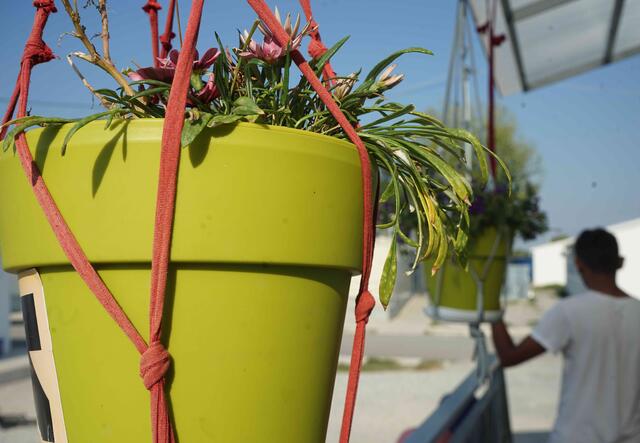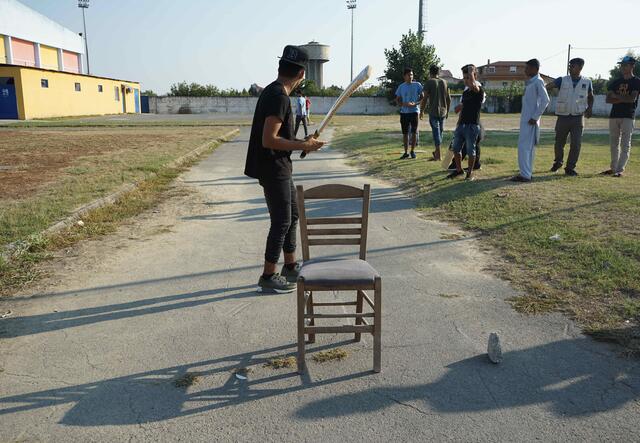What is the FUTURA project?
FUTURA, Fostering the Transition of Unaccompanied children to Adulthood, is an IRC project that provides accommodation for asylum-seeking unaccompanied children aged between 16 and 18, in ten Supported Independent Living (SIL) apartments in Athens, Greece.
FUTURA is implemented under the outcome for ‘addressing urgent needs for the reception and screening of asylum seekers and for the accommodation of vulnerable groups’ of the Asylum and Migration programme of the EEA Grants.
The project provides quality accommodation and a holistic package of individualised support services to at least 120 unaccompanied children - like young Bahar -, over the course of 33 months.

Each FUTURA apartment hosts four children who receive a range of services, such as legal aid, individual and group psychosocial support, non-formal education and skill-building activities. All services are tailored to the needs of each child, by a core team of experienced social workers, caretakers and interpreters, with particular emphasis placed on empowerment and self-reliance.
The caretakers ensure that children develop the skills they need to live independently, they are able to perform household tasks and manage their budget with limited supervision from staff. The staff and the children jointly create individual development plans aiming at achieving the children’s full potential in life.

The SIL apartments are considered to be an alternative to the traditional institutional models of accommodation, with great potential to support children’s transition to independence and their integration into the local community. The project increases their chance of success outside of the institutional system, by providing them will all needed tools and skills for independent living.
The FUTURA team also aims to inform public entities, NGOs, and civil society groups on key project developments and good practices in child protection, through events, reports and social media.

In October 2020, the IRC launched the FUTURA project via an online event, in which IRC staff, national authorities, journalists, and NGOs held a fruitful discussion about child protection in Greece and the advantages of accommodation in SILs. The event flagged the need for and the importance of multi-sectoral cooperation and advocacy on unaccompanied children’s rights.
As the project unfolds, children living in the SIL apartments and their caretakers will share their stories to give you an insight into the project’s structure, purpose and progress.
You can follow FUTURA on Twitter here to find out about our news, events and stories.
Read the stories of Ali and Bahar, two teenagers forced to flee their home and supported by the FUTURA Project in Greece.
For further information, contact [email protected].
More information about the donors
About the programme
The “Asylum and Migration” (addressing urgent needs for the reception and screening of asylum seekers and for the accommodation of vulnerable groups) programme in Greece, financed by Iceland, Liechtenstein and Norway, was awarded a total budget of 16,5 million euros as part of the EEA Grants 2014-2021. The program aspires to contribute to ensuring legal protection, support and care for the most vulnerable asylum seekers, with emphasis on unaccompanied children. The Fund Operator for the “Asylum and Migration” programme in Greece is SOL Consulting S.A in partnership with Human Rights 360. More information.
About the EEA Grants
Τhe EEA Grants are jointly financed by Iceland, Liechtenstein and Norway. The EEA Grants are available to the 13 EU member countries that joined the EU and the European Economic Area (EEA) in 2004, 2007 and 2013 as well as Greece and Portugal. The decision-making body of the EEA Grants is the Financial Mechanism Committee, which is composed of representatives of the Foreign Ministries of Iceland, Liechtenstein and Norway. More information.
About the Fund Operator
The Fund Operator for the “Asylum and Migration” (Addressing urgent needs for the reception and screening of asylum seekers and for the accommodation of vulnerable groups) programme in Greece is SOL Consulting S.A in partnership with Human Rights 360.
SOL/ Crowe
SOL Crowe provides auditing and consulting services to an expanded network of organizations and companies operating in the public and private sector in Greece and abroad. The Company provides customized solutions in the entire spectrum of consulting services aimed at supporting, reorganizing and sustainable development of our customers. The services provided cover all areas of corporate activities - Management Consulting Services, Tax Services, Financial Services, Risk Management Services, Human Resources Services, Business Monitoring Services, HTL Services, Technology Services - creating direct and visible value to businesses and organisations. The company is staffed with highly specialised consultants, with experience and professional knowledge and competence, ensuring the efficiency and quality of services provided.
HumanRights360
HR360 is a civil society organisation established in Greece. Its mission is to protect and empower the rights of all, with no discrimination, giving special focus on the most disadvantaged and vulnerable populations. The cornerstone of its action is the belief that the social inclusion may be achieved only through the protection of the individual, political and social rights of the entire population, and that through wider alliances, both in Greece and internationally, open and tolerant societies can be built, rejecting the Far-Right rhetoric, the extremism and xenophobia, and encouraging the participation of all citizens.
The main pillars of HR360 activities is integration services (mainly in refugees’ field such as legal aid and borders monitoring), reintegration services and support of vulnerable people (homeless, ex prisoners), combating hate crimes through recording incidents for the Network of Racist violence, promoting campaigns, participating to researches, reports, editions and providing legal support to victims of racist crimes, strategic communication and advocacy for human rights protection, and management of regranting programmes.